Queen Elizabeth II: Has the rewind button been pushed on reconciliation in Northern Ireland?
- Published
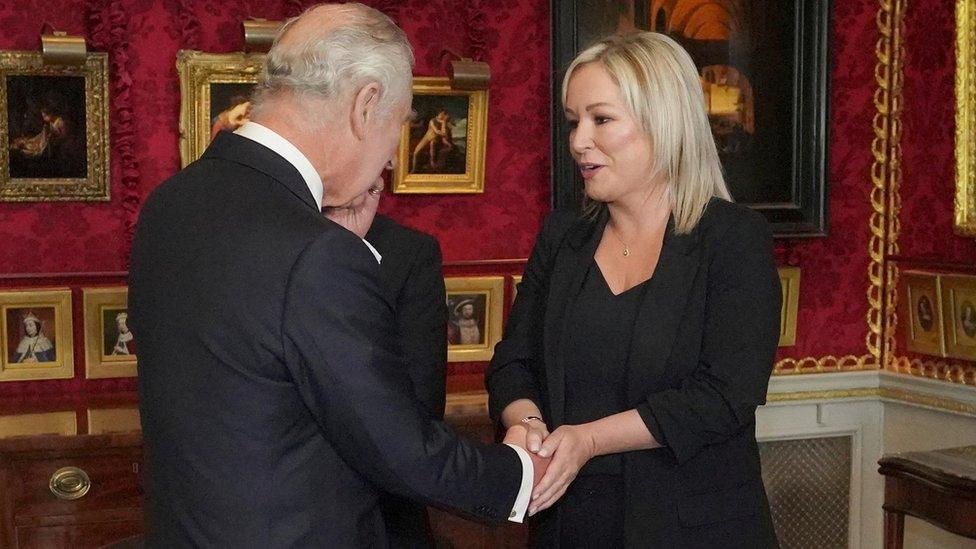
Sinn Féin deputy leader Michelle O'Neill met King Charles at Hillsborough on Tuesday
Despite the success of King Charles III's historic visit to Northern Ireland, has the rewind button been pressed on reconciliation?
The question was posed at an event on Tuesday just after the King left.
Crowds gathered at Hillsborough and in Belfast to welcome the King and Camilla, the Queen Consort.
During the visit, assembly Speaker, Sinn Féin's Alex Maskey, delivered a message of condolence to the royal couple on behalf of the assembly.
He said everyone was "thankful for Queen Elizabeth's commitment and encouragement to building peace and reconciliation across these islands and indeed for all of those who seek to keep us moving towards that goal".
On Tuesday night, the King's visit, the work of the Queen to promote reconciliation and Mr Maskey's speech were all discussed at an event to launch a new book - Living with Ghosts - by the journalist and author Brian Rowan.
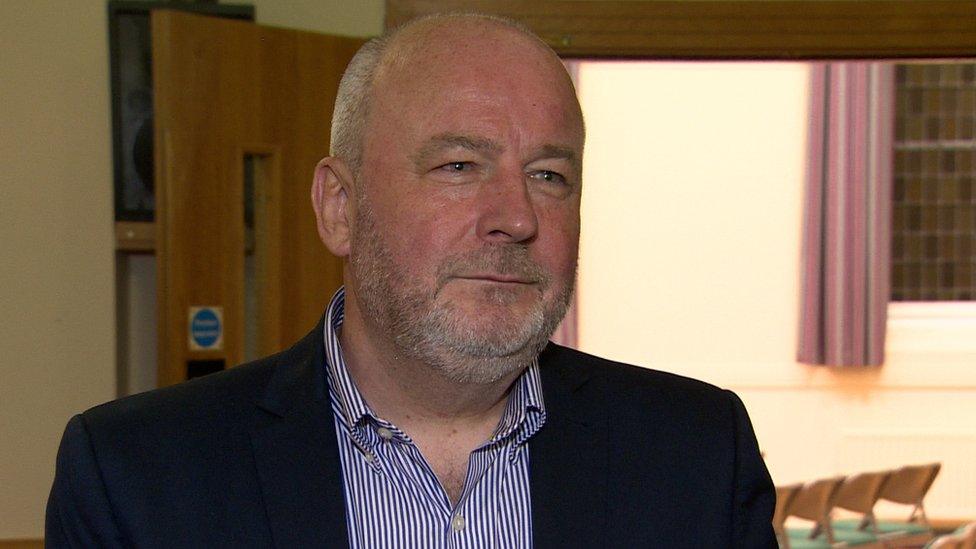
Author Brian Rowan said he had been most hopeful of progress more than a decade ago in 2007
It was attended by many who have had a close-up view of the peace process, including senior loyalists and republicans.
For some, like the former head of the Northern Ireland Civil Service, David Sterling, the King's visit offered a chance to change the political stalemate at Stormont.
"There's perhaps just an opportunity," he told BBC News NI.
"There's maybe a moment that if somebody could just capture, perhaps could bring the parties back together and maybe build from that and get the executive restored, because people here, because public services here, need it really badly."
'Not enough leadership'
For Mr Rowan, though, there was concern about what the current political division means for the peace process as a whole.
"We have pressed the rewind button and so I think that's the problem, that on occasions when we've got momentum we slow it down," he said.
He said he had been most hopeful of progress more than a decade ago in 2007.
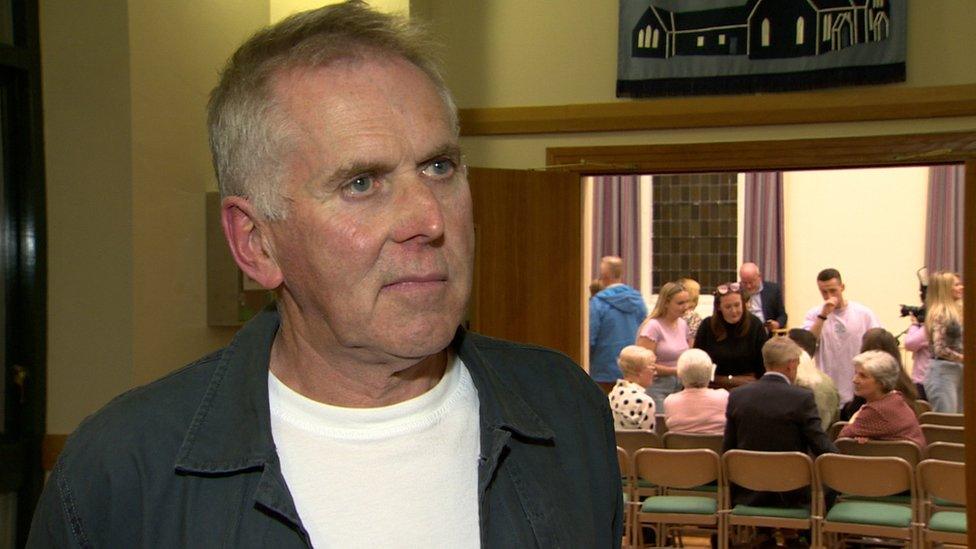
David Sterling said the King's visit offered a chance to change the political dynamic at Stormont
That year in the newly-restored Northern Ireland Assembly, the first minister, Democratic Unionist Party leader Ian Paisley, and the deputy first minister, Sinn Féin's Martin McGuinness, surprised many by establishing a rapport and good working relationship.
They were labelled the Chuckle Brothers as a result of being frequently photographed laughing and smiling together.
Earlier in January of that year, Mr Maskey and Sinn Féin leader Gerry Adams attended the late loyalist leader David Ervine's funeral on east Belfast's Newtownards Road, external.
"That was the moment when I thought we had a chance," Mr Rowan said.
"The best chance of this process so far.
"But if you ask me, could Gerry Adams step on to the Newtownards Road in 2022? No he couldn't, and that's what I mean about [how] we've pressed the rewind button."
His concerns were shared by Jeanette Ervine, David Ervine's widow.
"I try to be hopeful because I feel our young people, they don't want to know, the majority of them don't want to know," she told BBC News NI.
"They want normality and I think they deserve that, but I think there are too many just living for yesteryear and they don't want to change it.
"We all need to reach out to the other community.
"There isn't enough leadership, definitely - I think that is a huge problem, it really is."
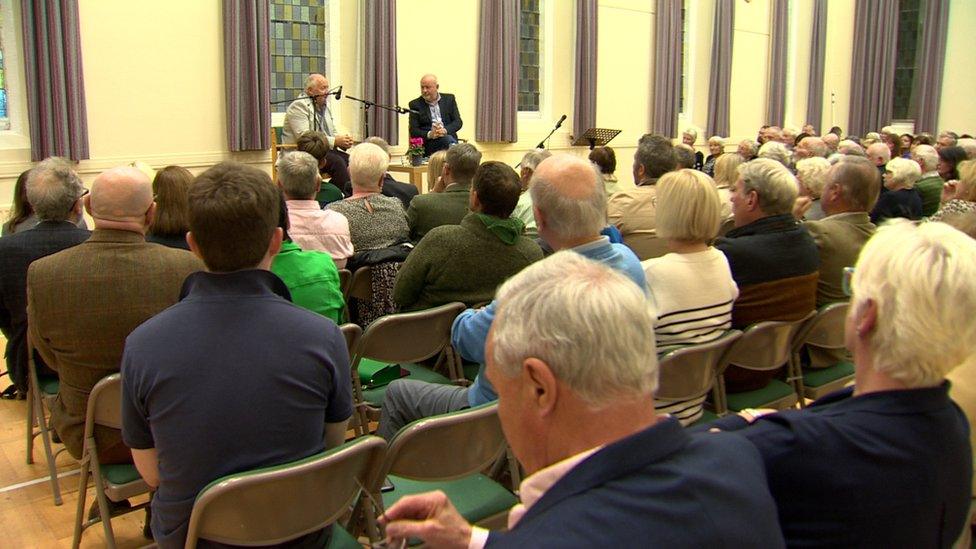
The book launch was attended by many who have had a close-up view of the peace process
She said the Queen's actions and words on her state visit to Ireland in 2011 and her handshake with Mr McGuinness in 2012 were still examples of reconciliation to follow.
"I think David would have been very, very pleased, as I was," Ms Ervine said.
"I thought it was great that she reached out and I think we need more of the same.
"We need people reaching out to each other."
Senior loyalist Jackie McDonald was also at Tuesday's event, and agreed with those opinions.
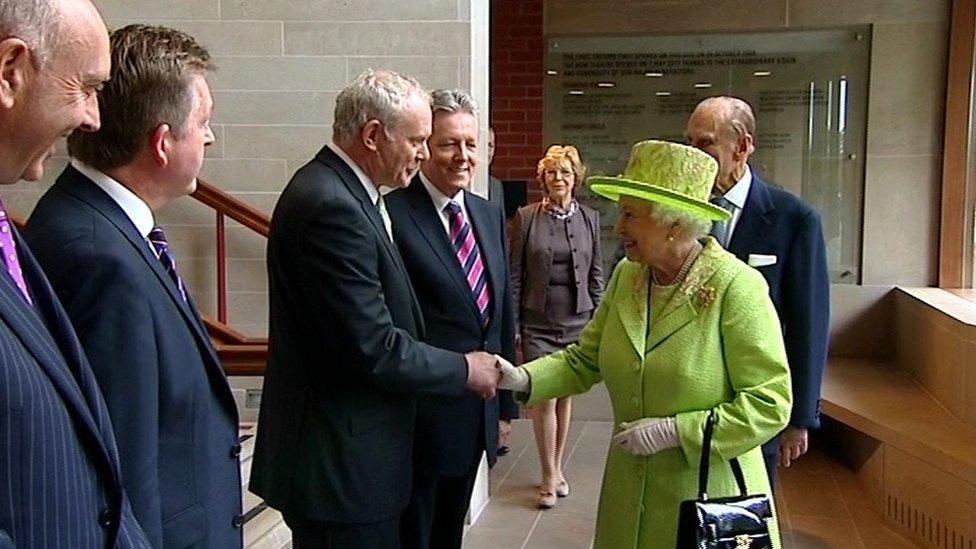
Queen Elizabeth II shook hands with Sinn Féin's Martin McGuinness in 2012
"The fact that she shook Martin McGuinness's hand, it meant so much to everybody," he said.
"We need to take a leaf out of the Queen's book, see the efforts she made on behalf of the people of Northern Ireland for peace to try to encourage people to go on the right road and we should all learn from that."
'Asking our children to do the work'
Another who referenced the Queen's importance to peace in Northern Ireland was the Reverend Harold Good.
Along with the Catholic priest Fr Alex Reid, the Methodist minister was an independent witness to IRA decommissioning in 2005.
Speaking at the book launch, Dr Good recalled how the Queen had spoken of Northern Ireland's troubled past on her state visit to Ireland in 2011.
During a speech at a state banquet in Dublin Castle, the Queen had said: "With the benefit of historical hindsight, we can all see things which we would wish had been done differently or not at all.
"In that line there was acknowledgement of history," Dr Good told the audience at Tuesday's launch.
"You talked about the need for truth.
"We're not going to move on to the next stage until we are open strong and honest enough with each other."
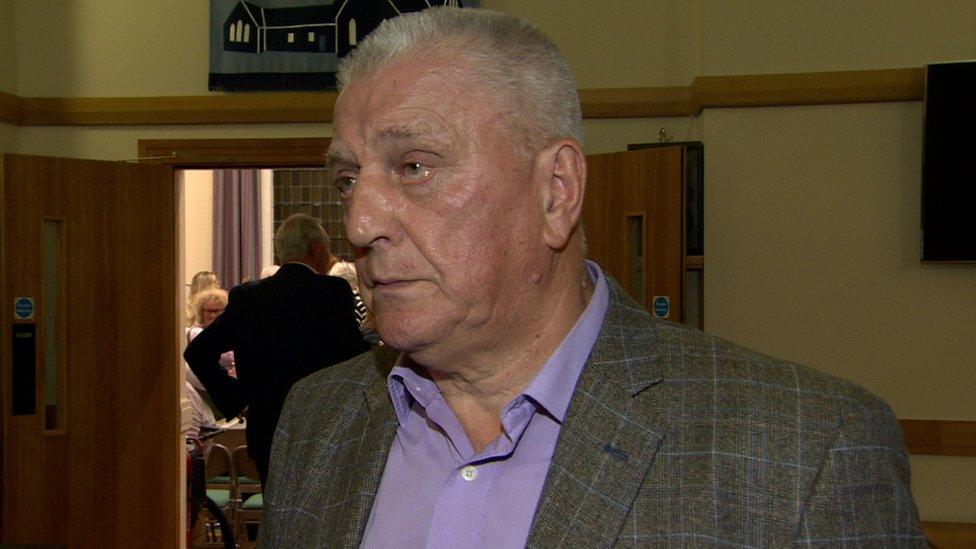
Loyalist Jackie McDonald said the Queen's actions should be an example to people
He went on to say that it was up to adults in Northern Ireland to "leave a better legacy to our children, the generation that's coming behind us than the one which we inherited".
He continued: "Do you know one thing I worry about? Our children don't know our history.
"We need to find ways of helping them to understand our history.
"To understand the present you need to understand the past, and to understand the future we need to leave the past where it belongs.
"We're all saying integrated education, great idea.
"Do you know what worries me about that? We're asking our children to do something that we're not always prepared to do ourselves."